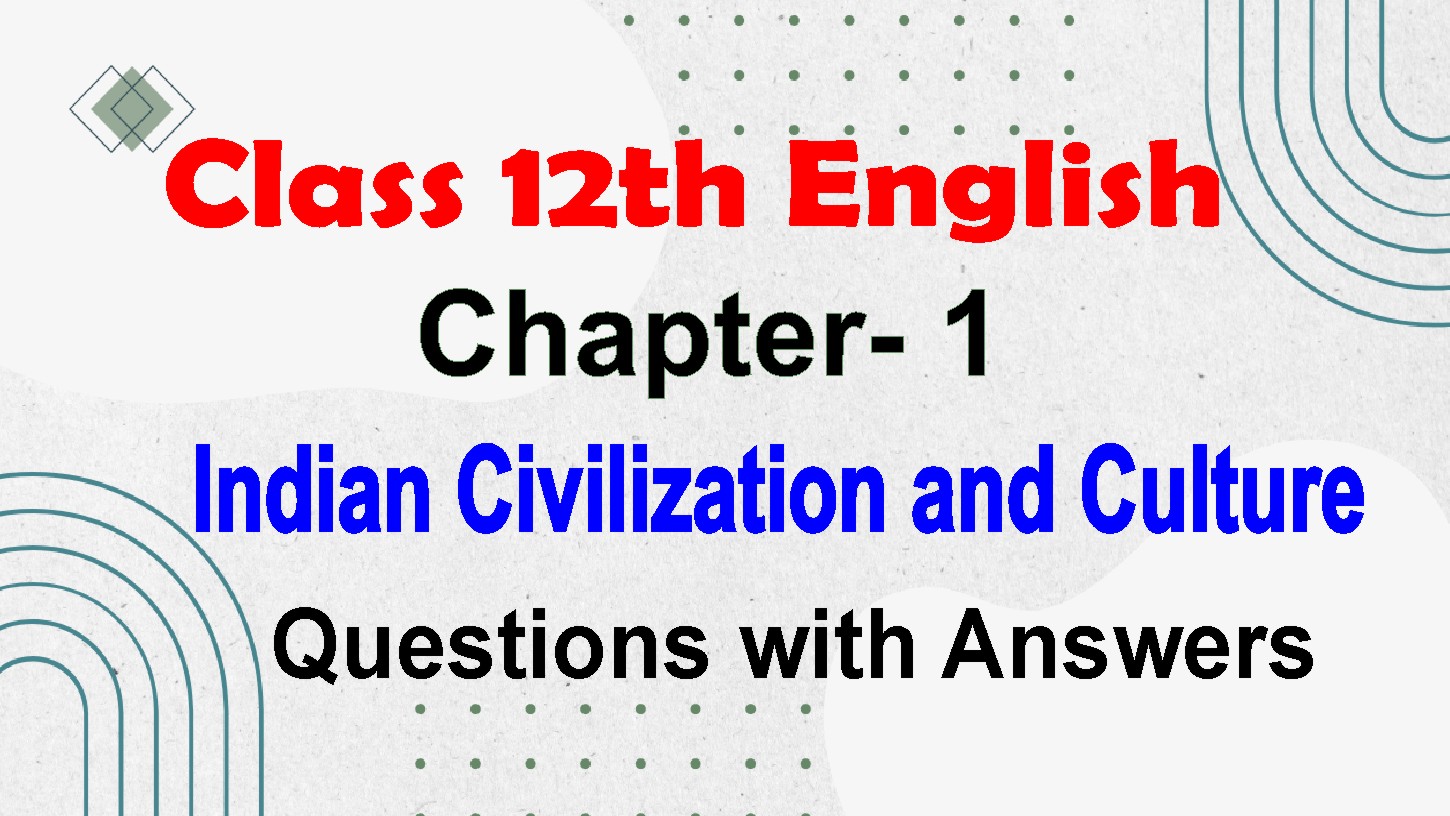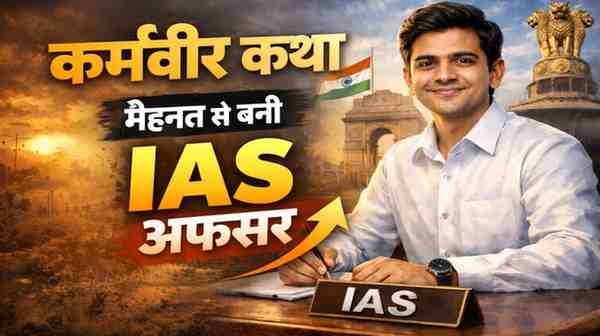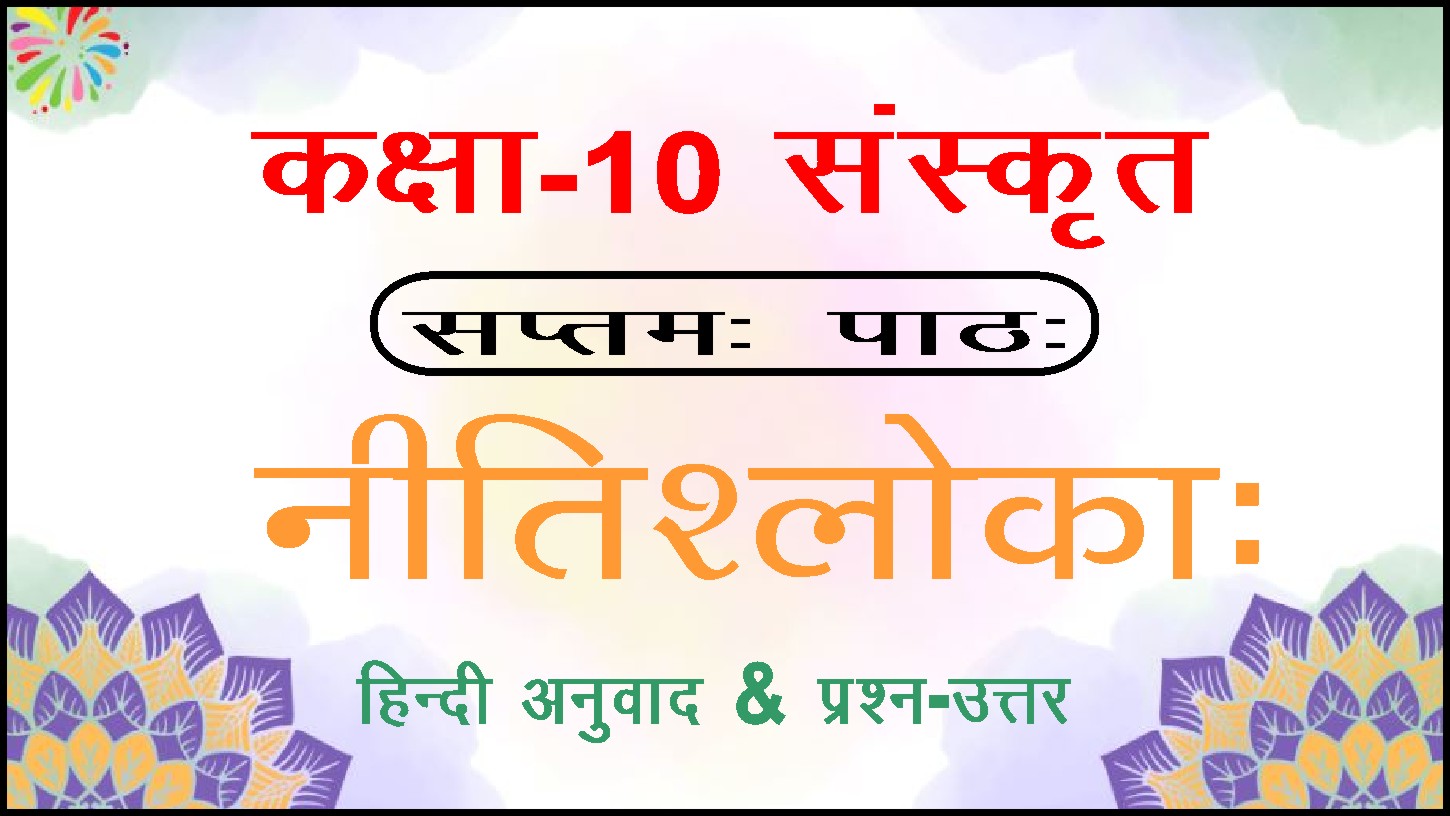12th Class English Chapter 1 Indian Cicilization and Culture Questions With Answers
Doston is Post me mai aapko 12th Class English Chapter 1 Indian Cicilization and Culture Questions With Answers kiya hun ummid karta hun ki aapko ye post kafi pasand aayegi. agar aaplog kisi Board Exam ki taiyari karna chahte hai to aap hamare Youtube Channel Unlock Study par jakar kar sakte hain.
Indian Cicilization and Culture Questions With Answers
OBJECTIVE ANSWER TYPE QUESTIONS WITH ANSWERS
1. Name the author of the prose piece, “Indian Civilization and Culture”.
(a) Manohar Malgaonker
(b) Mahatma Gandhi
(c) Martin Luther King Jr.
(b) Mahatma Gandhi
2. Mahatma Gandhi in his essay deals in
(a) customs and traditions
(b) Poverty and unemployment
(c) civilization and culture
(c) civilization and culture
Write ‘True’ or ‘False’ :-
(i) The tendency of Indian civilization is to elevate the moral being.
True
(ii) Our distinguishing characteristic of modern civilization is not an indefinite multiple of human wants.
False
(ii) Our civilization, our culture, our swaraj depend upon multiplying our wants.
False
(iv) Dr. Radhakrishan did not brought to the presidency mental equipment and a degree of erudition.
False
(v) Nanukaka stood in the doorway of a second class carriage.
True
(vi) America has given the Negro people a bad cheque.
True
(vii) We must allow our creative protest to degenerate into physical violence.
False
VERY SHORT ANSWER TYPE QUESTIONS WITH ANSWERS
Q. 1. Who is the writer of “Indian Civilization and Culture” ?
Mahatma Gandhi.
Q. 2. What does Mahatma Gandhi discuss in his essay ?
Civilization and culture.
Q. 3. Why the large cities were a share and a useless encumbrance and people not happy?
Because of Gangs of thieve, robbers and prostitutes.
Q. Complete the following sentences on the basis of your reading:
(a) A man is not necessarily happy because because he is rich of unhappy he is poor
(b) Large cities were a share and a useless encumbrance and that people would not be happy in them,
(c) In no part of the world and under no civilization have all men attained perfection,
(d) A certain degree of physical harmony and comfort is necessary but above a certain level it becomes a hindrance instead of help,
(e) Our civilization, our culture, our swaraj depend not upon multiplying our wants,
(f) A man must arrange his physical and cultural circumstances so that they do not hinder him,
(g) ‘Indian civilization and culture’ has been written by Mahatma Gandhi.
Q. 4. Complete the following sentences on the basis of what you have studied.
(a) India’s glory is that it remains immovable
(b) The charge against India is that her people are so uncivilized, ignorant and stolid that it is not possible to induce them to adopt any change.
(c) We dare not change what we. have tested and found true on the anvil of experience.
(d) Our ancestors set a limit to our indulgences because the more we indulge in our passion, the more unbridled they become.
(e) Our forefathers did not invent machinery because they knew that if we set our hearts after such things, we would become slaves and lose our moral fibre.
SHORT ANSWER TYPE QUESTIONS WITH ANSWERS
Q. 1. How is Indian civilization different from European civilization.
Ans. There is a basic difference between the Indian civilization and Europeon civilization. The tendency of Indian civilization is to elevate the moral being whereas the western civilization propogates immorality.
Q. 2. Why does Gandhi say that “mind is a restless bird?” What makes the mind restless ?
Ans. “Mind is a restless bird”, because the more it gets the more it wants, and still remains unsatisfied. Our needs are unending. The more we indulge in our passions, the more unbridled they become.
Q. 3. Why did our ancestors dissuade us from luxuries and pleasures ? Did they do the right thing?
Ans. Our ancestors observed that a man is not necessarily happy because he is rich or a man who is poor is un unhappy. The rich are often seen to be unhappy and the poor to be happy. Observing all this our ancestors dissuaded us from luxuries and and pleasures. They were perfectly right in their observance and action.
Q.4. Why, according to Gandhi, have we stuck with the same kind of plough as existed thousands of years ago? Should we do the same thing even today?
Ans. According to Gandhiji we have managed with the same kind of plough as existed thousands of years ago. It was not that we did not know how to invent machinery, but our forefathers knew that if we set our hearts after such things, we would becomes slave. No, we cannot follow today the same kind of plough. We shall lag behind. Moreover now the population has gone very high.
Q. 5. How did our ancestors view large cities? Why were they satisfied with small villages?
Ans. Our ancestors saw that happiness was largely a mental condition. They further reasoned that people would not be happy in large cities and there would be gangs of thieves and robbers, prostitutes and wrong doers (evil persons). That is why they were satisfied with small villages.
Q. 6. How did our ancestors enjoy true “Home Rule”?
Ans. Our ancestors saw that kings “all powerful” were inferior to the Rishis and Fakirs. The nation had courts, lawyers and doctors, but were all within bounds. Vakils and vaids did not rob people. They were considered people’s dependents not their masters. The ordinary rule was to avoid courts, though justice was fair. There were no touts to tempt and misguide people. The evil too was noticable only in and around capitals. The common people lived independently and followed their agricultural occupation. Thus they enjoyed true “Home Rule”.
SHORT ANSWER TYPE QUESTIONS WITH ANSWERS
Q. 1. What, according to the author is modern civilizations?
Ans. The modern civilization is the worship of the material according to the author. It is also the worship of brute in us. It is unadulterated materialism. It has no existence if it does not think at every step of the triumph of material civilization. As such the author has advised us to keep away from it at all costs.
Q. 2. What did the author convey to the countrymen about dealing with modern civilization?
Ans. The distinguishing characters of modern civilization, is an indefinite multiplicity of human wants, which the author observed. Hence the author conveys to the countrymen to keep away from modern civilization.
Q. 3. What is the distinguished characteristic of modern civilization?
Ans. The distinguishing characteristics of modern civilization is an indefinite multiplicity of human wants. The modern or western state of dissatisfaction arises really from want of living faith in a future state and therefore also in Divinity.
Q. 4. The author perceived danger from modern inventions. How?
Ans. The author became aware of immediate and distinguished results of modern inventions. It has maddened to resist and nobody dare to oppose it. According to him we are in danger of exchanging permanent good for a momentary pleasure.
Q. 5. What does the author prefer to materialism?
Ans. Author prefer development along spiritual lines rather than development along material and materialism The modern people will have to perish under the weight of materialism. So he prefers restricting our wants.
Q. 6. What does our civilization depend upon ?
Ans. Our civilization, our culture, our Swaraj depend not upon multiplying our wants-self-indulgence, but upon restricting wants-self-denial.
Q. 7. What is civilization in the real sense of the term?
Ans. Civilization in real sense of term, consists not in multiplication but in the deliberate and voluntary restriction of wants. This alone increases and promotes contentment, real happiness and capacity for service.
LONG ANSWER TYPE QUESTIONS WITH ANSWERS
Q. 1. ‘I BELIEVE that the civilization, India has evolved is not to be beaten in the world. What does Gandhi mean by this statement? Do you subscribe to his views ?
Ans. Gandhi means to say that the Indian civilization is peerless. The seed sown by our ancestors can not be equalled. The Indian civilization has seen the doom of civilizations like the ancient Roman and Greek. Japan, now has become westernized. It means that India is the only ancient civilization which remains in her stupendous magnificance, Indian civilization is the only civilization in whole world which has not lost its glory or is not westernized. When we go somewhere else we only hear about the civilization which once existed there but when it comes to India, we can proudly say that ancient India is still living. Yes, definitely I subscribe to his view and I am proud to be a part of this culture and civilisation.
Q. 2. ‘We notice that the mind is a restless bird, the more it gets, the more it wants, and still remains unsatisfied’. Pick out other metaphors used in this lesson. How do these metaphors help Gandhiji in persuading the readers?
Ans. Some of the metaphors from the given lesson are: ‘So understanding and believing, it behaves every lover of India to cling with old Indian civilization even as a child clings to the mother’s breast’, ‘It may be that my reading is wrong, but I know that for India to run after the Golden Fleece is to court certain death’. The metaphors helped Gandhiji in persuading readers as they make the language more attractive and simpler. They also clearify the significance of the topic. The comparison between two terms make the basic concept clear and makes the speech ardent.
Q. 3. ‘A man is not necessarily happy because he is rich or unhappy because he is poor? The rich are often seen to be unhappy the poor to be happy; What according to Gandhi, holds key to real happiness? How does Gandhi define ‘happiness’?
Ans. According to Gandhi, the key to real happiness lies in satisfaction. If we indulge in our passions, our desire gradually increase and even if fulfilled, there is a new craving which does not allow us to be happy and content. The rich people having luxurious desire for yet more comforts and often poor people not taking interest in luxuries and comfort bridles his passions and thus keeps himself content, satisfied and happy. So, the key real happiness lies in restriction of desires of our giddy mind and usage of hand and feet. Gandhi defines happiness as largely mental condition. Happiness is a stressless, joyful condition of mind.
Q. 4. Why did our ancestors feel satisfied with small villages ? Did they do the right thing? Will it be wise today to follow our ancestors in this connection? Give your own views.
Ans. Our ancestors felt satisfied in small villages because they knew that large cities were a trap and a useless burden and that people would not be happy in them, that there would be gangs of thieves robbers and prostitution, and vice flourishing in them and that poor men would be robbed by rich men. Yes, they obviously did the right thing to protect our ancient civilization. Yes, it would be wise to follow our ancestors because we need to save our civilization. We should not run after trigling luxuries but we should follow the routes of our ancestors who found about the soul, the spirit and the religion. The west cannot give us real happiness because real happiness is not materialism but satisfaction.
Q. 5. Discuss the negative features of western civilization ?
Ans. The negative features of western civilization are: This civilization is the worship of material, the worship of brute in us. It is complete materialism. Secondly, the most distinguishing feature of this civilization is an indefinite multiplicity of human wants. This civilization tends to propagate immorality and promotes disspative people. This civilization instigates us to become slaves of luxuries and comforts. It has the ideal of creating an unlimited number of wants and satisfying them which is a delusion and a snare.
Q. 6. What is the essential difference between the Indian civilization and Western civilization? How is our civilization superior to the Western civilization?
Ans. The essential difference between the Indian civilization and the Western civilization is that west promotes an indefinite multiplicity of human wants whereas Indian civilization keeps a strict command on our desires. Also Western civilization is complete materialism but Indian civilization depends on the worship of the supreme spirit. Our civilization is superior to that of Western as our civilization elevates moral being and Western civilization promotes disspatives. Western civilization has made wonderful discoveries in things of materials but they hold no rank amongst the great and marvellous discoveries which our civilization has made of the spiritual and religious things.
Q. 7. ‘A certain degree of physical harmony and comfort is necessary but above a certain level, it becomes a hindrance instead of help’. Elaborate.
Ans. It is true that physical peace and comfort is compulsory for our body to remain healthy. Our body also needs rest and peace, but only upto a limit, to an extent. When we give our body more luxury and comfort than what it needs, it becomes habituated of it and asks for even more. This thing multiplies our desire for more luxurious things. This multiplicity is a snare, trap which turn our desires into voluptuousness and thus become a hindrance, a breaker in our service of humanity. Instead of giving us energy and strength, the excess comforts disturb our mind.
Q. 8. Write the summary of the essay “Indian Civilization and Culture.
Ans. Mahatma Gandhi is his essay “Indian Civilization and Culture” has described the importance of Indian civilization. He talks of the sound foundation of Indian civilization which has successfully withstood the test of time. The western civilization cannot match it. It is so because Indian civilization elevate the moral being whereas the western civilization is weded to materialism. Mahatma Gandhi considers Indian civilization to be the best in the world. He points out that while Roman and Greek civilization perished, Indian civilization continues to exist. The western countries charge that India is unwilling to change and therefore they consider it to be a great demerit. Mahatma Gandhi considers this immovbility a great merit. Mahatma Gandhi raises Indian working with hands and feet instead of machine. It keeps our moral fibre in order. The author strongly disapproves promotion of materialism in life as it breeds vice. He favours village or rural life against city life. He thinks that city life encourages wants which lead to material life. Mahatma Gandhi is not against of what is good in other’s civilization. He is in favour of absorbing the good things from other country’s civilization. Gandhijee concludes that Indian civilization is superior to any other civilization in the world. It generates moral power that helps in developing a composite and harmonioas personality. As such people in India have eternal happiness. So, the indian civilization is unparallel and can not be beaten in the world. The seeds sown by our ancestors were deep-rooted and had developed miraculously in a big tree with many of its branches spread over the heart of India. The present essay is significant. The style of the essay is very fine. The words used in this essay are so simple that we can understand this essay very easily.
C. 2. Group Discussion :
Discuss the following in groups or pairs:
Q. 1. Truth and non-violence have been the biggest weapons of mankind.
Ans. Truth and non-violence are biggest weapons of mankind. They do not hurt people physically. They change the heart of the enemy. The power of these weapons is greater than the combined physical forces of the world. Nothing violent can be done against these weapons. Physical force is truth but moral force brings peace and harmony. It has been shown by Gandhi who used these weapons to combat the Imperial British forces. Ultimately he won without causing bitterness.
Q. 2. High thinking can not go alongside high living.
Ans. High living is possible only with money and wealth. It is the worship of material gains. So there is sno time for high thinking. High living demands a constant search for luxury and pleasure. So there is no time for adding money and wealth for the persons having high thinking and plain living. However one has a limited wants. Since physical needs are limited, the spritual qualities came up for thinking and delegation. Mental and physical energy are directed towards higher aspects of thinking. There is no hinderance of physical wants. Thus we see that High living cannot go alongside high thinking.
C. 3. Composition:
Write a paragraph in about 100 words on each of the following:-
(a) The real dignity of man lies not in what he has but in what he is.
Ans. The real dignity of man does not lie in wealth and physical power. The saints and sages have been given higher respect in society than even a king. The king with his soul and “military power” does not have the same dignity-as a spritual man. He bows his head before such men. The sword of ethics is far greater than the sword of a king. So the universal respect is shown in the man who has knowledge and wisdom. There is a proverb that a learned man is respected everywhere whereas a king has his narrow domain. He is respected only in his kingdom. It is the respect given to the throne. It is because of his post and position that he is respected. But a learned man is respected by kings and common men. His power lies in himself, and not in chair, position or wealth So a person can be deprived of worldly acquisitions but his dignity is unharmed.
(b) The crown and glory of life is character.
Ans. Life has many things which make it worthliving. So many things are required for life. Essentials and non-essentials are parts of a long and colourful life. We pass through pleasures and pain. We acquire wealth and fame. We also acquire knowledge and wisdom. Some people learn guile and cunning. But all these things donot make the highest achievement: It is the character that is the crown and glory of life. Character brings to a person a kind of divine power and the strength to fight evils and injustice. That dazzles others into submission and obedience. It makes the people trust us and feel secure in our company A man of character does not have any fear. He has a dignity and respect that is more precious than any other thing in life.
D. Word Study:
D. 1. Dictionary Use:
Ex. 1. Correct the spelling of the following words:
disuaded, ocupation, votries, imorality, unadultereted, matarialism, beleif, madning, engrev, harmoney.
Ans:- dissuaded, occupation, votaries, immorality, unadulterated, materialism, belief, maddening, engrave, harmony.
Ex. 2. Look up a dictionary and write two meanings of the following words the one in which it is used in the lesson and the other which is more common.
reason, thinking, wants, ruin, copy.
Ans. Reason–Cause of power of thought, area.
Thinking-Come to conclusion, intelligent.
Wants–Scarcity, Need.
Ruin–Destruction, Decay.
Copy–Reproduction, imitate.
D. 2. Word-formation:
Read carefully of the following sentence taken from the lesson:
Each followed his own occupation.
In the above sentence the word ‘occupation’, which is an abstract noun, is derived from the verb ‘occupy’. Now, derive abstract nouns from the verbs given below and use them (abstract nouns) in sentences of your own:
convert, perform, define, please, educate, observe.
Ans. convert — conversion
perform — performance
define — definition
please — pleasure
educate — education
observe — observation
D. 3. Word-meaning:
Ex. 1. Find from the lesson words the meanings of which have been given in Column A. The last part of each word is given in Column B:
‘A’ ‘B’
Someone related who lived long time ago Ancestor For
of one’s homeland Indigenous nous
being a burden to Encumberance ance
to spread ideas, beliefs, etc. Propagate ate
slow-witted Stolid lid
advise against Dissuade ade
Ex. 2. Fill in the blanks with suitable words (gerunds) from the given list:
(i) Pragya’s writing is not very legible.
(ii) The police could not control the maddening crowd.
(iii) We are in danger of bartering momentary. away the permanent good for a
(iv) Gandhi always believed in simple living.
(v) Amandeep’s thinking was quite logical.
D. 4. Phrases:
Ex. 1. Read the lesson carefully and find out the sentences in which the following phrases have been used. Then use these phrases in sentences of your own:
satisfy with, be suited to, believe in, cling to, in vain.
Ans. satisfy with —We cannot be satified with what we have.
be suited to — Western civilization is not suited to Indian people.
believe in — Indian civilization believed in self-denial.
cling to — You cannot cling to a weak branch of a tree in vain.
in vain — My search for wealth was in vain.
E. Grammar:
Ex. 1. Complete the sentences given below by using the appropriate forms of the verbs given in brackets:
(a) Indian Civilization has kept it alive till now. (keep)
(b) I see here ancient Indian still living (live).
(c) We have borrowed many things from western literature. (borrow)
(d) We have been copying west since long. (copy)
(e) Arya did speak so. (speak)
(f) Nehru had written so many letters to his daughter from jail. (write)
Ex. 2. Study the following sentence from the lesson:
We notice that the mind is a restless bird, the more it gets the more it wants……
Mark the use of double comparative in the above sentence. Look at the examples given in the table :
The + comparative (1st) The + comparative (2nd)
The harder you work, the better you achieve
The more she earns the more she wants
Form ten sentences of your own choice on this pattern.
Ans. (i) The higher you go the cooler you feel.
(ii) The more you get the more you want.
(iii) The more he gets the more he asks for.
(iv) The more you eat the less hungry you feel.
(v) The more you read the more you remember.
(vi) The more you know the less you remember.
(vii) The greater you effort the easier the task becomes.
(viii) The more the birds come the greater the noise becomes.
(ix) The costlier is the computer the faster is the performance.
(x) The faster you run the more tired you become.

















